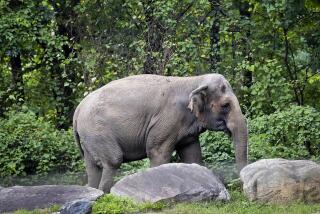Review: ‘An Elephant Sitting Still,’ Hu Bo’s first and last feature, is a haunting dispatch from northern China
- Share via
“Another lousy day begins,” a man growls near the start of “An Elephant Sitting Still,” and he doesn’t know how right he is. This extraordinary, overpoweringly bleak movie, a first feature from the Chinese writer-director Hu Bo, plays out over a single day that will grow steadily worse for four people whose slow, meandering paths occasionally intersect.
Misery may love company, but these individuals seem most defined by the intensity of their isolation — a spiritual condition that follows them out of their dim, squalid apartments and into the sparsely populated streets of the city they are unfortunate to call home.
We are in a gloomy industrial ruin somewhere in northern China. Jobs and prospects are scarce, infrastructure either collapsing or nonexistent. The substandard local high school is about to close without warning, leaving its students with an even more uncertain future. Nothing here works, and no one expects that anything will improve. Physical violence erupts at random on the streets and is inflicted on a more intimate, everyday scale at home.
Everyone here is petty, self-interested and mean — under the circumstances, who wouldn’t be? — but the movie’s consoling, deeply humanist insight is that they remain people worth knowing. And Hu opens up their world with a dogged persistence matched only by his exquisite sensitivity. Within a narrative framework that might have seemed schematic in another filmmaker’s hands, he allows his characters and their sad, often solitary experiences to command the attention of the camera and the viewer in turn.
The aforementioned growler is the father of Wei Bu (Peng Yuchang), a teenager with a quiet demeanor and a thousand-yard stare. He and a friend are being mercilessly bullied by another kid at school, a conflict that seems destined to end badly. Wei Bu has a crush on a female classmate, Huang Ling (Wang Yuwen), who is romantically involved with a married school administrator. As we learn from her mother, with whom she argues bitterly, today is Ling’s birthday; needless to say, it won’t be a happy one.
It takes some time for us to learn the connection between Wei Bu and Yu Cheng (Zhang Yu), a handsome brooder and small-time gangster who’s having an affair with his best friend’s wife; the sequence in which the friend returns home and catches them together, then takes sad, decisive action, is a small masterpiece of narrative and formal economy.
Hovering on the outskirts of the action is an older man named Wang Jin (Liu Congxi) whose daughter and son-in-law are trying to move him into a retirement home. Jin’s gentle interactions with his young granddaughter, and with his dog, are among the few moments of emotional respite.
The movie’s title alludes to an elephant that is kept as a circus attraction in Manzhouli, a distant city that some of the characters dream of visiting so they might see it for themselves. The elephant might be, like them, an object of persecution (some spectators like to stab it with forks), but it is also, enviably, a creature at rest and at peace, impervious to the harsh and hostile world around it.
The people we see have no such escape. Over the course of a day they will witness and participate in a remarkable cycle of events — a soap opera season’s worth of romantic indiscretions, sudden deaths, unfortunate accidents, provoked and unprovoked attacks — in a story that somehow never loses its sense of balance and modulation. One of the reasons “An Elephant Sitting Still” is so absorbing is that it has the advantage of duration, a willingness to linger in moments of silence and stillness. Paradoxically, as a result, it moves far more swiftly than you might expect.
Here is where I’m supposed to alert you that this movie runs nearly four hours, at which point you will either close the browser tab or turn the page. Would it convince you to hear that it doesn’t have a single boring moment, and that it plumbs emotional depths that can only be achieved with the investment of time? Without soft-pedaling his characters’ struggles — indeed, at the risk of sometimes pushing toward ugly, harrowing extremes — Hu locates within them a unifying soulfulness, a shared wellspring of anguish and grief, that reaches toward and occasionally touches the sublime.
He accomplishes this through a subtle range of expressive effects and techniques, among them the recurring themes of Hua Lun’s plaintively beautiful score. Mostly, he avails himself of a muted gray palette and a camera that seems to be forever on the move, floating behind the characters as they walk, following them up and down staircases, drifting beside them as they exchange words or stare into the void.
These flowing, uninterrupted shots may induce in devoted art-house-goers a twinge of auteur recognition. Hu was a student of Béla Tarr, the great Hungarian director who in movies like “Sátántangó” and “Werckmeister Harmonies” used a rigorously slow-gliding camera to usher the viewer into a raptly contemplative state. In one of those odd coincidences that can reveal the reach of a master’s influence, this week also sees the theatrical release of “Sunset,” from another Tarr disciple, the Oscar-winning László Nemes (“Son of Saul”).
Hu is less well known and will unfortunately give us no further expression of his remarkable talent. He committed suicide at age 29 in 2017, shortly before completion of “An Elephant Sitting Still.” The movie went on to premiere at the 2018 Berlin International Film Festival and was received with bittersweet ecstasy by critics and moviegoers, who rightly lamented the loss of a vital new voice in Chinese independent filmmaking.
The pall cast by Hu’s death will doubtless provoke crude theories about life imitating art, suicide being one of this movie’s unignorable preoccupations. But no such extra-textual associations should either embellish or diminish his achievement. He has given us a triumph of bold sociopolitical critique and intimate human portraiture, and a reminder that you rarely encounter the one without the other.
------------
‘An Elephant Sitting Still’
In Mandarin with English subtitles
Not rated
Running time: 3 hours, 54 minutes
Playing: Laemmle Glendale, Glendale
[email protected] | Twitter: @JustinCChang
More to Read
Only good movies
Get the Indie Focus newsletter, Mark Olsen's weekly guide to the world of cinema.
You may occasionally receive promotional content from the Los Angeles Times.











